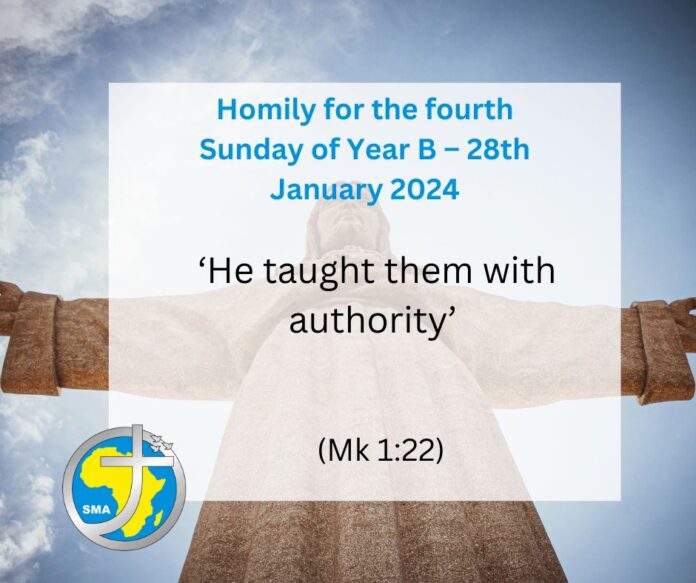Readings: Deuteronomy 18:15-20; 1 Corinthians 7:32-35; Mark 1:21-28
Theme: ‘He taught them with authority’ (Mk 1:22)
The theme of authority dominates our readings today. In the first reading from the book of Deuteronomy, we see that, at the time of Moses (around the 13th century BCE), the Israelites longed for a prophet who would speak God’s word to them and lead them on the pathway to life. Through Moses, God makes this promise to them: ‘I will raise up a prophet like you for them from their own brothers. I will put my words into his mouth and he shall tell them all that I command him’ (Deut 18:18). Our gospel reading from Mark shows that this promise was fulfilled supremely in Jesus Christ, whose authority astonishes the people assembled in the synagogue of Capernaum.
In the gospel reading, Mark makes a clear distinction between the teaching of Jesus and that of the Scribes, the official interpreters of Jewish Law. Scribes never expressed their own judgement or opinion. They always began by citing their authority and supported whatever they said with quotes from the great masters of the past. And their focus was on the external observances of the Law rather than its spirit. Their teaching failed to make much impression on the people because it lacked the power of personal conviction. Moreover, the scribes did not always practice what they preached (cf. Mt 23:3).
The people immediately recognized that Jesus was a different kind of teacher. ‘His teaching made a deep impression on them’ (Mk 1:22). Why did the teaching of Jesus have such an impact? In what way was it different from the teaching of the scribes? The words of Jesus had the power to move people’s hearts. They had the ring of truth about them because they came from personal experience. Jesus did not just repeat what others had said. He spoke with his own voice, his own authority. People listened to Jesus primarily because he was a living witness to the truth of God’s love. He showed this love by the way he lived. People experienced God’s mercy and compassion in his actions. He reached out to the sick and less privileged, those who were neglected or excluded by society. In today’s gospel we see him freeing a man tormented by an ‘unclean spirit’ (cf. Mk 1:23-26). This action moves the people to exclaim: ‘Here is a teaching that is new, and with authority behind it; he gives orders to unclean spirits and they obey him’ (Mk 1:27.) The authority of Jesus’ teaching is manifested, above all, in his actions.
We tend to associate authority with people in positions of power in society, like political or religious leaders, people we see as ‘authority figures’. In this sense, Jesus did not have any power at all. He was not a worldly king with political or military power. And he was not of the priests, who held religious power in Roman Judea. Nor did he have the authority of a scribe based on tradition. The only authority he had was the supreme confidence that what he did and said was God’s will and God’s truth, and the source of this authority lay in his intimate communion with his heavenly Father, his Abba, who, on the occasion of his baptism, had affirmed him as his ‘beloved son, in whom I am well pleased’ (Mk 1:11).
As we see in today’s gospel, Jesus uses his authority to liberate people from the evil forces that dominate their lives, and to bring them the blessings of health and healing, freedom and hope. He came, as he himself states, ‘to serve not to be served, and to give his life for us’ (Mk 10:45). And he wants us to imitate his example. ‘You know that those who are regarded as rulers of the Gentiles lord it over them… Not so with you. Instead, whoever wants to become great among you must be your servant’ (Mk 10:42-43). By virtue of our baptism, all of us share in the authority of Jesus, in his prophetic, priestly and kingly mission, even if we may have no official leadership position in the Church. And we are empowered and summoned to use this authority to serve others, as Jesus did.
I end with an apt reflection on today’s gospel from the pen of Flor McCarthy SDB.
‘Ideally words should always be preceded by deeds.
When people who have done something begin to speak, people listen.
Their words carry enormous weight.
They have real authority.
The weakness of a lot of words arises from the fact that they are not preceded,
or accompanied, or even followed by deeds.
At the root of innumerable wrongs in our world
is the discrepancy between word and deed.
It is the weakness of Churches, parties and individuals.
It gives people and institutions split personalities.
Lord, grant that what we have said with our lips,
we may believe with our hearts,
and practice with our lives.’ AMEN.
Fr Michael McCabe SMA
To listen to an alternative Homily for this Sunday, from Fr Tom Casey of the SMA Media Centre, Ndola, Zambia please click on the play button below.
|
|

